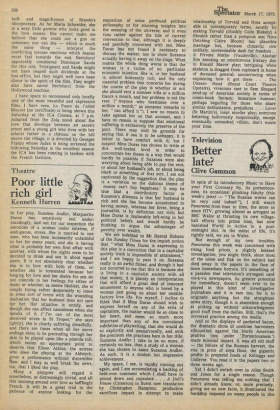Poor little rich girl
Kenneth Hurren
In I-er play, Suzanna Andler, Marguerite Duras has, sensitively and understandingly, laid out for our inspection the emotions of a woman under extreme, if ambiguous, stress. She is married to one man, who has been incessantly unfaithful to her for many years, and she is having what is probably her own first affair with another, with whom the nights seem to be devoted to drink and sex in about equal parts. It is not absolutely clear whether she is in love with both of them, or whether she is tormented because her long ng for love and her desire for sex do not coincide in her feelings for either of then-; or whether, as seems likeliest, she is simply trying rather desperately to come to some sort of terms with the wounding realkation that her husband does not care for her. Her situation is untidy, and though she can affect casualness when she speaks of it (" I'm one of the most deceived wives in St Tropez," she says lightly), she is clearly suffering dreadfully, and there are times when all her nerve endings seem to be protruding through her skin to be played upon like a pianola roll; which seems an appropriate point to observe that Eileen Atkins, the actress who does the playing at the Aldwych, gives a performance without discernible flaw, and I may as well break the news, too, that I liked the play.
Many a playgoer will regard it nonetheless, as distressingly trivial, and all this mooning around over love as bafflingly French. It will be a great trial to the patience of anyone looking for the exposition of some profound political pnilosophy or for stunning insights into the meaning of the universe; and it even runs rather against the tide of current convention in that, although it is deeply and painfully concerned with sex, Mme Duras has not found it necessary to discuss the matter, nor to show Suzanna actually having it away on the stage. What makes the whole thing worse is that the woman is a victim of no particular economic injustice. She is, or her husband is, almost indecently rich, and the only material problem that concerns her during the course of the play is whether or not she should rent a summer villa at a million francs a month, and her problem is not the rent (" Anyone who hestitates over a million a month," as someone remarks to her, "can afford it "). I saw no reason to take against her on that account, and I have no reason to suppose that emotional suffering is exclusively the preserve of the poor. There may well be grounds for saying that if one is to be unhappy, it is better to have comfort with it; but I suspect Mme Duras has chosen to write at this well-heeled level in order to concentrate her theme in a way that would hardly be possible if Suzanna were also worrying about being able to pay the rent, or about her husband's job, or about being black or something of that sort. I am not captivated by the suggestion that the play is a variation on the dubious theme of money can't buy happiness.' It may be true that a contributory factor in Suzanna's dilemma is that her husband is rich and she has become accustomed to having money, whereas her lover, being a journalist, is by definition not rich; but Mme Duras is implacably left-wing in her political beliefs and would hardly be thinking to argue the advantages of poverty over wealth. We are indebted to Mr Harold Hobson of the Sunday Times for the impish notion that "what Mme Duras is expressing in this play is a conviction that in a capitalist society truth is impossible of attainment," and I am happy to pass it on. Suzanna really is an awful fibber, and though it had not occurred to me that this is because she is living in a capitalist society with all that money, it is plainly an interpretation that will afford a great deal of innocent amusement to anyone who is bored by a woman just going on about her unsatisfactory love life. For myself, I incline to think that if Mme Duras should wish to express herself on any of the evils of capitalism, the matter would lie so close to her heart, and seem so much more important than any of the convoluted subtleties of playwriting, that she would do so explicitly and unequivocally, and with the precision she practises here in her title: Suzanna Andler I take to be no more, if certainly no less, than a study of a woman she has chosen to name Suzanna Andler. As such, it is a modest but impressive achievement.
My space, I see, is rapidly running out again, and I am accumulating a backlog of held-over comment which I shall have to pound down and capsulate . . . A Doll's House (Criterion) in fluent new translation by Christopher Hampton; production sacrifices impact in attempt to make relationship of Torvald and Nora acceptable in contemporary terms, mostly by making Torvald (chuckly Colin Blakely) a likeable rather than a pompous ass; Nora (fetching Claire Bloom) has plausible marriage but, because climactic row unlikely, unreasonable dash for freedom . . A Private Matter (Vaudeville), Alastair Sim amusing as mischievous literary don in Ronald Mayor play; intriguing w'nile skeleton is dragged from cupboard in home of deceased general; unconvincing when explaining how it got there . . . The Unseen Hand (Royal Court Theatre Upstairs), vivacious cast in Sam Shepard send-up of American society in terms of comic-book fantasy; immature humour; perhaps beguiling for those who share similar enthusiasms, prejudices . . . Lover (St Martin's), inept murder play; everyone behaving ludicrously suspiciously, except eventually unmasked villain; don't waste your time.


































 Previous page
Previous page